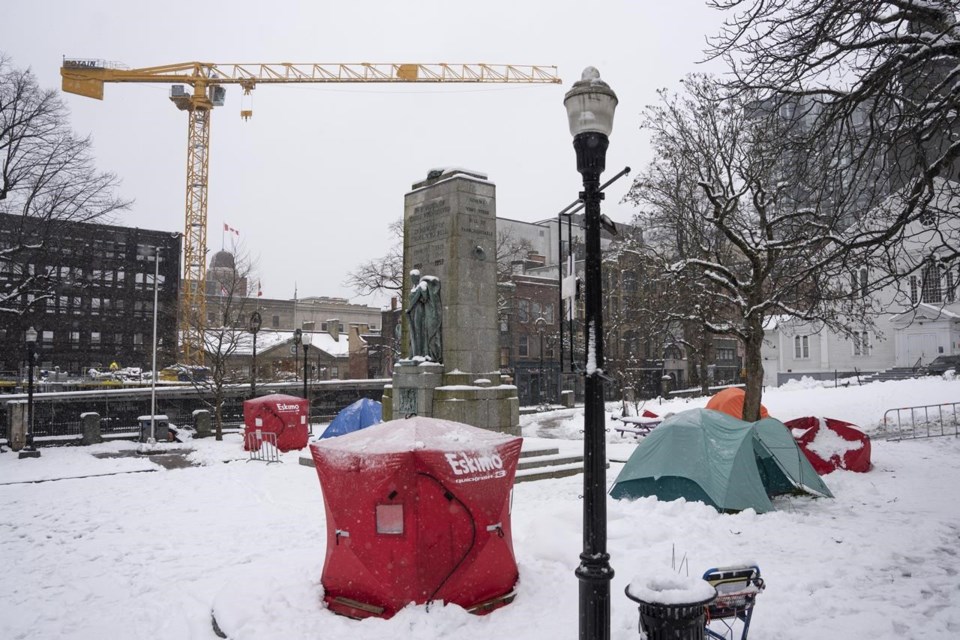WHITNEY PIER, N.S. — Residents of Whitney Pier, in Cape Breton, are wary of the Nova Scotia government's plan to locate 30 single-unit pallet shelters for unhoused people, a reaction that reflects the difficulty of addressing the problem of homelessness across the province.
Lorne Green, who represents Whitney Pier on Cape Breton Regional Municipal Council, says he’s received hundreds of emails and texts from area residents, many of whom question how their neighbourhood will change once the hard-sided shelters are installed.
“The biggest fears are the unknowns,” Green said Monday in an interview, adding there has been no consultation with locals about the project. “My phone has not stopped.”
To address rising homelessness, the provincial government announced in October it would spend $7.5 million to buy 200 shelters produced by American manufacturer Pallet, with 100 to be erected in Halifax. The province says the "village" in Whitney Pier will be composed of 30 shelters with access to electricity, washrooms, laundry and on-site support as required by the manufacturer.
Some of Green's constituents are afraid, he said, because of the "stigma" associated with homelessness, including fears that shelters will bring increased drug use and violence to the neighbourhood.
“If it causes the community any disruption by way of any unwanted activity they want some assurance that it will be rectified if it should happen,” Green said.
The councillor said he heard from one resident whose pending sale of her home fell through because of the shelter announcement.
The shelters are to be built by March on provincially owned land that used to be a parking lot for the former Sydney Steel plant. New Dawn Enterprises, a community development corporation, and the non-profit Ally Centre of Cape Breton are to manage the shelters.
Green said concerned residents are gathering on Tuesday to prepare for a Feb. 5 meeting with the Department of Community Services and the site managers.
Alyce MacLean, the project manager of housing development for New Dawn Enterprises, said about 400 people are currently homeless in the Sydney, N.S., area, which includes Whitney Pier.
“This is a crisis situation where we feel incredible urgency,” said MacLean.
The Whitney Pier site is within one kilometre of a bus stop and close to services such as water, sanitation and electricity — one of the criteria imposed by Pallet for the use of its products.
MacLean also pointed out that many of the current concerns were raised about eight months ago when New Dawn received $5 million from the Canada Mortgage and Housing Corporation to build 25 housing units in Sydney’s north end. She said many of those concerns were alleviated once her organization sat down and explained its plan to the community. She believes that can happen again during the Feb. 5 meeting with Whitney Pier residents.
“Once they (residents) get information they still might feel uneasy, but they feel informed and they also feel that they have a path to express concerns,” said Maclean.
She said the site will be fenced and there will be security cameras and staff supporting the site 24 hours a day to ensure the safety of the tenants.
“We are not just plunking people down and forgetting about them,” said MacLean.
In an email, a spokeswoman for the Community Services Department said the government is moving ahead with the Whitney Pier location based on the availability of the land and the need to provide shelter quickly.
“We are working closely with our service providers … as well as Pallet to ensure that these communities are best set up for success for not only the residents, but the larger community,” said Christina Deveau.
Earlier this month, the province announced the first 19 of the 200 shelters would be built in the Halifax suburb of Lower Sackville by early next month. Another 20 units are to be located in Kentville, N.S., within the next two months, along with an undetermined number that will be going up near the Halifax Forum in February or March.
This report by The Canadian Press was first published Jan. 22, 2024.
— By Keith Doucette in Halifax.
The Canadian Press




